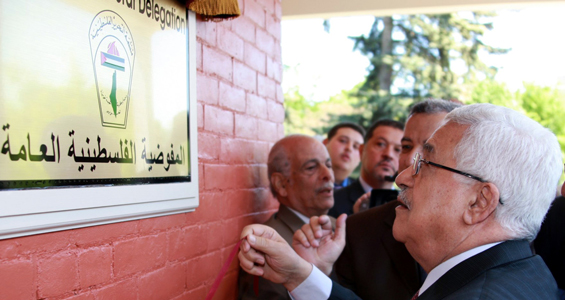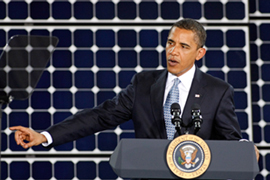Obama’s Palestinian conundrum
Question of Hamas lurks in the shadows as Mahmoud Abbas visits White House.

 |
| Questions remain over who exactly Mahmoud Abbas represents [AFP] |
In one sense, it is only half a meeting.
When Mahmoud Abbas, the Palestinian president, meets his US counterpart Barack Obama this week, two questions will lurk in the shadows: where is Hamas and who does Abbas really represent?
The reason for those questions lies largely in the actions of the previous US president, George Bush. In 2006, on an ill-fated crusade to spread democracy in the Middle East, he pushed hard for Palestinian elections. Most of Bush’s advisers thought Abbas’s Fatah faction would win.
Instead, Hamas won. It was a political party non grata in the US, and worse, listed by the state department as a “terrorist” organisation.
Bush chose to ignore the internationally-approved election results, and dealt exclusively with Abbas. That led to fighting with Hamas, and the splitting of the Palestinian polity into Hamas-run Gaza, and the Fatah-dominated West Bank.
Legitimacy question
So the Palestinian leader Obama will be talking to about a two-state solution heads only half of a two-headed Palestinian territory.
Edmund Ghareeb, a professor of Middle East history and politics at American University, says the problem of Abbas’s legitimacy is compounded by the structural diplomatic weakness of the Palestinians.
“The Palestinians do not have very strong institutions; the Palestinians do not have military; they do not control their own territory,” he says.
“They do not have even a functional government in that sense because of the internal divisions that exist within the Palestinian community, between Hamas and Fatah.”
‘Ready to talk’
But while the Bush administration ignored and ostracised nations and political movements it considered beyond the pale, the Obama White House is ready to talk to the world.
 |
| Obama must deal with the problem of the power of his own prestige [AFP] |
Hillary Clinton, the US secretary of state, told Al Jazeera in an interview last week that the Obama administration is ready to include Hamas in the peace process, with some conditions.
“We would expect Hamas to recognise Israel’s right to exist, to renounce violence as a way to securing a homeland for the Palestinian people, and to recognise the prior agreements. I think that is an incredibly reasonable request.”
In contrast with the Bush administration, whose deliberations were famously closed-door, or involving experts from previously marginal right-wing think-tanks, the Obama White House is calling on a wide range of outside, mainstream advisers who openly call for Hamas to have a seat – in a Palestinian unity government – at the negotiating table.
“You cannot have a peace agreement, if you are genuinely interested in a peace agreement, you can’t have it without them,” says Henry Siegman, the director for the US/Middle East Project, Council on Foreign Relations.
Siegman’s outfit submitted a report to Obama on rejuvenating the peace process, and says the Bush anathema on Hamas needs to end:
“They are not quintessentially a terrorist movement. It’s a nationalist movement that resorted to terrorism,” he says.
Question of representation
Beyond the challenge of dealing with a leader who does not really represent the Palestinians, at least by the only available democratic measure – the results of the 2006 vote – Obama must deal with the problem of the power of his own prestige.
While just a senator running for the presidency last summer, he visited Abbas in Ramallah, in order to earn a little statesmanlike gravitas.
Now the tables have turned, and it is Abbas who can gain a little lustre from visiting the White House.
But that only goes so far. If Abbas sounds too in tune with Obama’s views, he will face even more accusations back home of being an US puppet, possibly rendering a unity government with Hamas, and a peace deal with Israel, even harder.